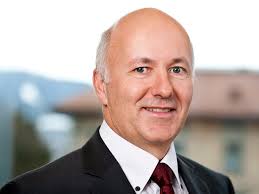Walking and Flying Robots for Challenging Environments
Prof. Dr. Roland Siegwart
Autonomous Systems Lab
Institute of Robotics and Intelligent Systems
ETH Zurich
Disaster response operations or industrial inspections are among the most rewarding but also very challenging tasks for autonomous mobile robots. While robots are already doing a wonderful job as factory work-horses or floor cleaning devices, operations in highly unstructured and unknown environments, which are typically encountered after disasters, in mines or on offshore oil rigs, are still a major challenge. In this talk, our latest research results in legged and flying robots systems, designed to operate in complex environments, are presented and discussed.
Our electrically powered legged quadruped robots are designed for high agility, efficiency and robustness in rough terrain. This is realized through an optimal exploitation of the natural dynamics and serial elastic actuation. Equipped with laser scanners and cameras, our quadruped StarlETH and ANYmal are able to autonomously find their path through rough terrain, climb stairs and build a 3D map of their environment.
For fast inspection of complex environments, flying robots are probably the most efficient and versatile devices. However, the limited payload and computing power of multi-copters renders autonomous navigation quite challenging. Thanks to our custom designed visual-inertial sensor, real-time on-board localization, mapping and planning has become feasible and enables our multi-copters for advanced rescue and inspection tasks, even in GPS-denied environments.
Overcoming the limited power autonomy and flight range of multi-copters is the main focus of our research in unmanned solar airplanes. Our most recent design of a fixed wing solar airplane with 5.6 m wing span allows for unlimited flight durations, thus enabling search and rescue from the air over large environments. Thanks to on-board visual sensing, these solar airplanes are also capable to fly very close to ground and plan their path around obstacles.
Roland Siegwart (born in 1959) is founding co-director of the Wyss-Zurich and professor for autonomous mobile robots at ETH Zurich. He studied mechanical engineering at ETH, spent ten years as professor at EPFL (1996-06), was vice president of ETH Zurich (2010-14) and held visiting positions at Stanford University and NASA Ames. He is and was the coordinator of multiple European projects and co-founder of half a dozen spin-off companies. He is recipient of the IEEE RAS Inaba Technical Award, IEEE Fellow and officer of the International Federation of Robotics Research (IFRR). He is in the editorial board of multiple journals in robotics and was a general chair of several conferences in robotics including IROS 2002, AIM 2007, FSR 2007 and ISRR 2009. His interests are in the design and navigation of wheeled, walking and flying robots operating in complex and highly dynamical environments.
